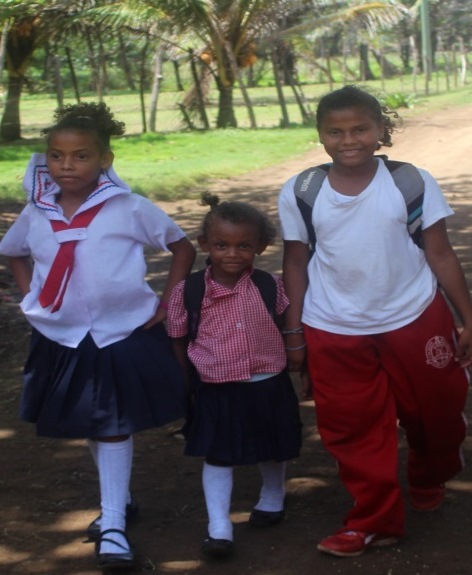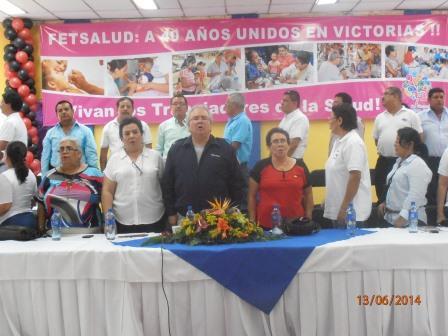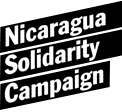Solidarity, Briefings
EDUCATION
On 19th July 2014, Nicaragua celebrated the 35th Anniversary of the Sandinista revolution, which saw the overthrow of the Somoza dictatorship. Following 17 years of successive neo-liberal governments, the FSLN (Sandinista National Liberation Front) was returned to power in 2007. Since then the Government’s actions and efforts have led to a remarkable transformation in society, not least in the field of education.
The period from 1990-2006 was marked by mass privatisation of public services and huge public spending cuts. A crackdown on trade unions and the public sector meant that the public sector came close to collapse; 66% of public sector workers lost their jobs and the trade unions were severely weakened. Teachers were poorly paid, earning significantly less than the basic cost of living and worked in difficultconditions, with many schools having fallen into disrepair and class sizes ranging from 50 to 80 pupils. Increasing numbers of children were unable to receive even a basic education, due mainly to the inability of parents to meet the costs of books and uniforms, travel (particularly in rural areas) and ‘user fees’ imposed by the International Monetary Fund. Literacy rates dropped to 64%.
When President Daniel Ortega took office in January 2007, his first act was to eliminate school fees and to begin a process to recover the right to free universal education. This is now enshrined in the National Plan for Human Development. The Government sees education as a priority and a human right. It believes that no child should be without an education and has introduced a number of social programmes to ensure that all children can benefit from a quality education. Among these is the school meals programme, which guarantees a good meal each day for each student. In urban poor neighbourhoods and rural areas where food security is a major issue, the school meals programme and the school garden programme provide major incentives for families to keep their children in class.
Other solidarity programmes include supportive educational packages (uniforms, backpacks, school supplies), textbooks, solidarity vouchers for graduates and repair and improvement of school facilities. The fact that education is now free and not dependent on the ability to pay means that pupil retention rates are now at 95% in primary and 86% in secondary schools. However, rural areas do not always benefit from the same access as urban communities, and further steps are now being taken to ensure there is universal coverage of education in the country. Illiteracy has been virtually eliminated thanks to a National Literacy Campaign.

Photo: Steve Lewis
Teacher training has now been introduced in the whole of the country in order to motivate young people to enter the teaching profession and in June last year, Nicaraguan teachers received a solidarity bonus as part of the celebrations taking place to mark the National Day of the Teacher. In February 2015, teachers received a salary increase of 9% and the 2015 budget passed by the National Assembly has made provision for one thousand new teachers to be hired. Teachers now earn on average $250 per month as opposed to $90 per month in 2006. The National Workers Front, FNT, to which ANDEN belongs, also has a programme to provide technical education to adults who did not receive an adequate education during the neo-liberal years; this programme is specifically designed to equip adults with the knowledge and skills they need to find employment.
HEALTH
Nicaragua has gained international recognition for its achievements in terms of its programmes designed to alleviate poverty and reach the Millennium Development Goals. It is one of ten countries in Latin America and the Caribbean that have achieved the United Nations MDG of reducing the proportion of people who suffer from hunger by half. Maternal mortality and malnutrition rates have also been reduced by up to 50% and the Government has set up a network of state maternity centres (casas maternas) across the whole of the country. The casas maternas are now rolling out a training programme for community midwives, in order to ensure safer and more comfortable births.
One of the main problems facing health workers in Nicaragua is the incidence of Dengue fever across the country. In 2014, The Nicaraguan Ministry of Health (MINSA) reported 4,300 confirmed cases of dengue fever, a mosquito-transmitted illness, for which there is no vaccine and no specific treatment. A huge programme is underway in the country to seek to eradicate the disease. Volunteer health workers, together with community organisations, have been working to eliminate sources of standing water, which are breeding grounds for the mosquitos, and have been conducting fumigations and a process whereby they go house to house and put mosquito killing pellets in any standing water inside or outside the house.
In March 2014, the Government launched a week-long national vaccination campaign aimed at both adults and children. The campaign included vaccinations for adults and children against polio (which has not been seen in the country since the 80s), diphtheria, tetanus and pneumonia. A specific day was also designated for flu vaccines. Members of the health workers’ union FETSALUD, community organisations and other volunteers all participated in the initiative.
During the years of neo-liberal government in Nicaragua from 1990, the health service was terribly underfunded and suffered from acute shortages – this in spite of the fact that free health care was a constitutional guarantee. For example, a law was passed by the neoliberal governments of the 1990s that obliged the Nicaraguan government to buy expensive branded medicine from multi-national pharmaceutical companies through the private sector. Until 2007 Nicaraguans in effect ceased to have access to free healthcare.
Today, the government is transforming the way the health service works. Free health care has been introduced for all (this includes breast screening and ultrasound) and community health facilities are being rebuilt, so that there is access to primary care with at least one doctor and one nurse in each community. Health service workers are once again valued for their work, and in January 2014, the Government announced wage rises of around 7% for some 30,000 health workers, including doctors and nurses. Minimum wage increases have also been announced for all public sector workers.

Health union celebrates 40th anniversary
For further information see here
WOMEN
Women make up more than 53% of Nicaragua's population, yet the state and municipal sector has remained very much male-dominated, with men occupying most, if not all, senior positions. Considerable advances have been made, however, since the FSLN returned to power in 2007 and the position of women in society is gradually improving. Constitutional reforms enacted at the beginning of 2014 mean that there is now a minimum quota of women for party political and public office candidates and there is evidence of a continuing increase of women's participation in the social and economic life of the country.
Nicaragua now holds second place (after Venezuela) for the greatest reduction of inequality in Latin Ameriac and in 2014 was ranked 6th in the World Economic Forum's Gender Equality Index, way above the UK and USA. Nicaragua is now considered among those countries with the highest percentage of women in its Executive, Legislative and Judicial branches, as well as in Municipal Councils. The current Chief of Police is also a woman.
Many of the Government's social programmes are aimed at women and are designed to give women greater control of resources and increased economic independence. Examples include Zero Hunger, which has provided support for over 100,000 rural women and their families and Zero Usury, which supports 130,000 women with low interest loans and training to set up micro-businesses. Maternal mortality rates have been reduced by up to 50% and the Government has set up a network of state maternity centres (casas maternas) across the whole of the country to complement those which have already been set up by women's groups in a number of locations such as Jinotega, Ocotal and Matagalpa. It is hoped that there will be 181 maternity centres in Nicaragua by the end of 2015.
Nicaraguan trade unions are particularly keen to enhance the role of women in their unions, and this has been helped by projects being supported by the UK trade union movement. It is through these projects that Nicaraguan unions have succeeded in raising awareness and ensuring that women receive the training they need to enhance their participation in union work and activities and take on leadership roles. The unions themselves have benefitted from the overall climate in Nicaragua which encourages women's participation at all levels. One example of this is the fact that the National Executive of public sector union UNE comprises around 60% women, including the female head of the union's Youth Committee.
Some 65% of Nicaraguans work in the informal sector, for example selling goods at traffic lights and as ambulant market sellers and street sellers. They work in very difficult conditions and are often socially marginalised. The Confederation of Self Employed Workers, CTCP, was formed in 2002 in order to organise these workers, the majority of whom are women (and very often single mothers). The CTCP encourages women's involvement and participates in the Women's Committee of the National Workers' Federation, FNT. They have achieved a number of gains for the sector, including social security coverage and health benefits. The women's secretary for the CTCP is a councillor for the local municipal government in Managua, which is a further indication of how women from this sector have advanced politically.





